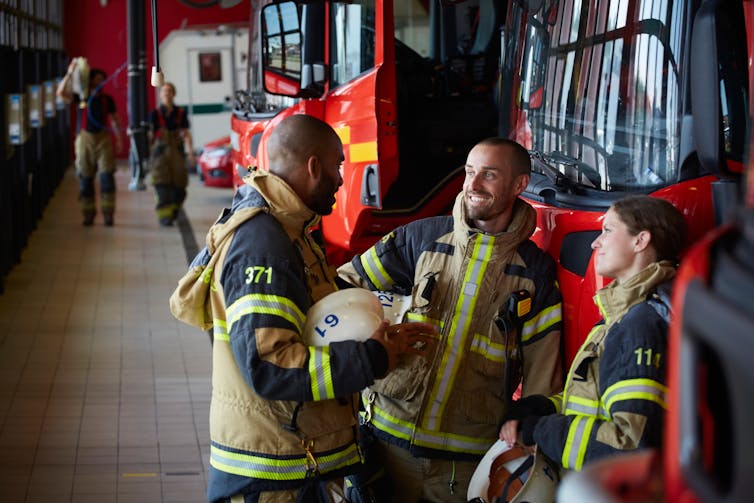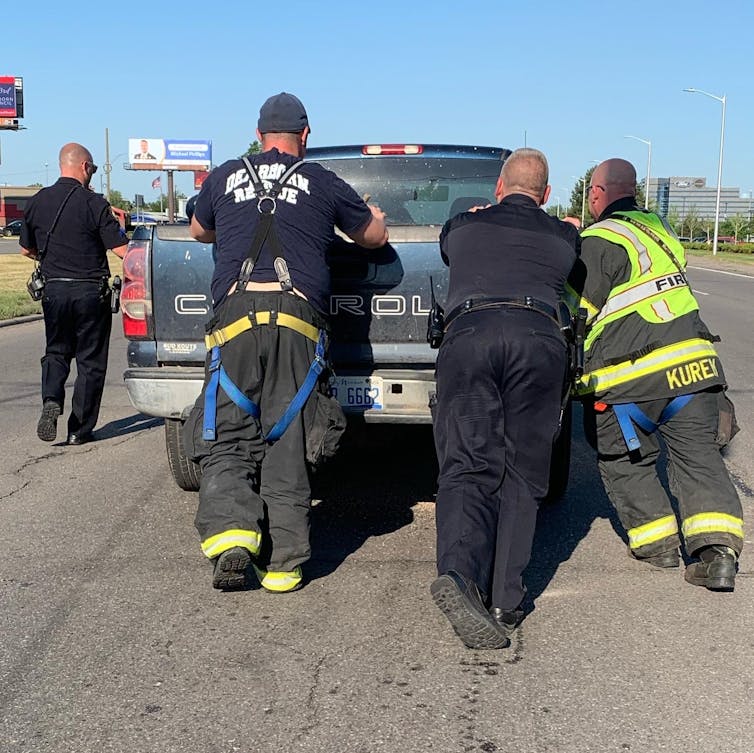Firefighters often silently suffer from trauma and job-related stress
- Written by Arash Javanbakht, Associate Professor of Psychiatry, Wayne State University
Matthew was exposed to unimaginable scenes of pain and suffering in his job over more than a decade as a firefighter. The last straw came when he witnessed the death of a teenager – who was the same age as his son – from an overdose.
“The worst part is when you see an infant or a child die,” he told me during a visit. “Exposure to their family’s pain – and that you could not save that life – is very heartbreaking.” Matthew, for whom I’m using a pseudonym to protect his privacy, was being treated at my clinic for post-traumatic stress disorder and depression.
Images of tragedy, loss of entire communities[1] and the terrible destruction wrought by deadly wildfires in the West have sadly become all too common[2]. But the public hears relatively little about the suffering of the firefighters who risk their lives and are away from their families for days and weeks at a time. And though firefighters are primarily recognized for responding to fires, they’re also often among the first to arrive at all other manner of disasters and accidents too, as Matthew’s example shows.
While the choice to become a firefighter often stems from a passion for, and a mindset of, helping others and saving lives, being constantly exposed to death, injury and suffering comes with a cost. Cumulative stressors include the physical toll on the body, long working hours, work-related sleep disturbance and an inability to attend to daily family life.
I am a psychiatrist and trauma expert[3] who often works with first responders[4] as well as refugees[5] and victims of war crimes. While many people think of firefighters as the happy heroes, the real-life, day-to-day experiences of these heroes can have real consequences for their mental health that remain largely invisible to the public eye.
The life of a firefighter
Firefighters have their own family-like “culture” and lifestyle, and they have experiences that often only their peers can relate to. Teams often spend whole 24-hour shifts together for years – even decades – and share holiday meals together when they can’t be with their own families.
 Firefighters spend long shifts together and tend to form close-knit bonds.
Maskot/Getty Images[6]
Firefighters spend long shifts together and tend to form close-knit bonds.
Maskot/Getty Images[6]
Recently, when I spent time with a firefighter team in Dearborn, Michigan, one of the firefighters who was of German descent made a full German dinner, complete with schnitzel, sauerkraut, potatoes and dessert. When I sat at my assigned seat waiting for others to join, the firefighter sitting next to me said, “If you wait, you might never be able to eat your dinner.” Sure enough, five minutes later we had to go out on a call. During the ride, I reflected on how stressful it is to drive at high speeds to a potential disaster where you will have to problem-solve to save a life – or fail at doing so.
The life of a firefighter requires a frequent and immediate switch from laid-back life at the station to racing to unimaginable scenes that could involve anything from a light car accident to horrible car crashes, where first responders have to pull people or bodies from crushed or burning cars.
Exposure to tragic scenes – and the associated risks to firefighters’ lives or their colleagues’ – is a routine part of this job. Often, firefighters are re-exposed to these traumatic experiences via stories in the media or through videos and other posts by bystanders on social media. During the ride along, one firefighter said of this re-exposure, “You see it on all the local TV channels, along with the frequent updates.”
Mental health impacts of stress and trauma
PTSD is a condition caused by exposure to traumatic experiences[7] such as natural disasters, war, shootings, motor vehicle accidents and assault. It can result from one’s personal exposure to a trauma, or to someone else’s exposure.
More often, people have heard about PTSD in the context of war, with combat-exposed veterans. While combat veterans often return to the normality of the civilian life after deployment, the job of firefighters, police officers and emergency medical services workers involves regular, routine exposure to all types of traumas, for years and decades of their careers.
The PTSD brain[8] is constantly on alert, screening for danger. Symptoms of PTSD include frequent nightmares, flashbacks, avoiding reminders of trauma and being easily startled and angered. Research shows that 20% of firefighters and other first responders[9] pass the diagnostic threshold for PTSD at some point in their career, in comparison with 6.8%[10] in the general population[11]. A higher number of first responders experience symptoms that do not meet full diagnostic criteria for PTSD.
Other consequences[12] of cumulative trauma exposure include depression, anxiety, substance use and suicide, all of which are more common among firefighters and other first responders than in the general population. Alcohol use[13] often becomes a coping mechanism. A recent study found that more firefighters and police officers die by suicide[14] than in the line of duty.
The challenges and solutions
The problem-solving and “being in charge” work attitude that is a strength of firefighters can sometimes become a barrier in seeking help, as they might see vulnerability as a sign of failure. Often I have heard from first responders the feeling of shame and worries that others might see them as weak for discussing these issues. First responders sometimes tell us that they can have a hard time trusting mental health providers, some of whom might not have much firsthand experience with understanding a first responder’s life and challenges. Firefighters often also find it impossible to share their tough work experiences with their families.
 Problem-solving and teamwork are a big part of a first responder’s job. Here, firefighters and police officers help move a car at a crash scene in Dearborn, Michigan.
Arash Javanbakht, CC BY-ND[15]
Problem-solving and teamwork are a big part of a first responder’s job. Here, firefighters and police officers help move a car at a crash scene in Dearborn, Michigan.
Arash Javanbakht, CC BY-ND[15]
Left unaddressed, trauma and chronic stress can lead to not only mental health consequences but also physical illness[16], including diabetes, hypertension and heart disease, obesity and chronic pain.
Steps forward
Fortunately, serious efforts are being made to spread awareness and fight stigma related to mental health. Peer-support programs[17] are made available to first responders to provide empathetic support and to encourage those in need to seek mental health care. Such programs can help fight stigma by explaining the mechanisms of trauma and stress in the body and brain. This approach can also reframe these experiences as vulnerabilities rather than weaknesses. The “don’t quit” mentality of firefighters can be shifted toward encouraging fighting the mental health consequences of trauma, instead of avoiding and denying it.
There are a growing number of effective treatments and interventions for addressing PTSD, depression and substance use, including talk therapy[18], lifestyle changes[19] and safe medications[20]. Knowing that the consequences of trauma can be resolved by proper interventions also helps reduce the stigma that can sometimes be associated with mental health problems. This can lead to the mindset that PTSD is a treatable condition rather than a label to live with for the rest of one’s life.
Researchers are using novel approaches to trauma therapy, including augmented reality, to help first responders, civilians and others heal and improve their well-being.Other comprehensive programs are underway nationwide, dedicating resources to providing education, support, prevention and intervention for first responders and their families. One such initiative[21], which involves my department[22] and my research clinic[23], recently started at Wayne State University with the support of the state of Michigan. This program aims to provide education, prevention, peer support and a statewide network of mental health providers familiar with specific challenges of first responders. We are also developing novel methods for trauma treatment using cutting-edge augmented reality and telemedicine technologies.
Having worked with hundreds of civilians and first responders with trauma over more than a decade, I have time and again seen people recover from PTSD and depression and successfully return to a thriving career and family life. I have high hopes that we can help create awareness and, ultimately, improve the lives and well-being of many first responders.
[Like what you’ve read? Want more? Sign up for The Conversation’s daily newsletter[24].]
References
- ^ loss of entire communities (www.nytimes.com)
- ^ all too common (www.theatlantic.com)
- ^ a psychiatrist and trauma expert (scholar.google.com)
- ^ first responders (theconversation.com)
- ^ as well as refugees (theconversation.com)
- ^ Maskot/Getty Images (www.gettyimages.com)
- ^ exposure to traumatic experiences (theconversation.com)
- ^ PTSD brain (doi.org)
- ^ 20% of firefighters and other first responders (doi.org)
- ^ in comparison with 6.8% (www.iaffrecoverycenter.com)
- ^ in the general population (www.ptsd.va.gov)
- ^ Other consequences (www.samhsa.gov)
- ^ Alcohol use (www.samhsa.gov)
- ^ die by suicide (rudermanfoundation.org)
- ^ CC BY-ND (creativecommons.org)
- ^ physical illness (theconversation.com)
- ^ Peer-support programs (www.iaffrecoverycenter.com)
- ^ talk therapy (www.ptsd.va.gov)
- ^ lifestyle changes (www.cnn.com)
- ^ medications (www.ptsd.va.gov)
- ^ One such initiative (today.wayne.edu)
- ^ my department (psychiatry.med.wayne.edu)
- ^ my research clinic (www.starclab.org)
- ^ Sign up for The Conversation’s daily newsletter (theconversation.com)

















